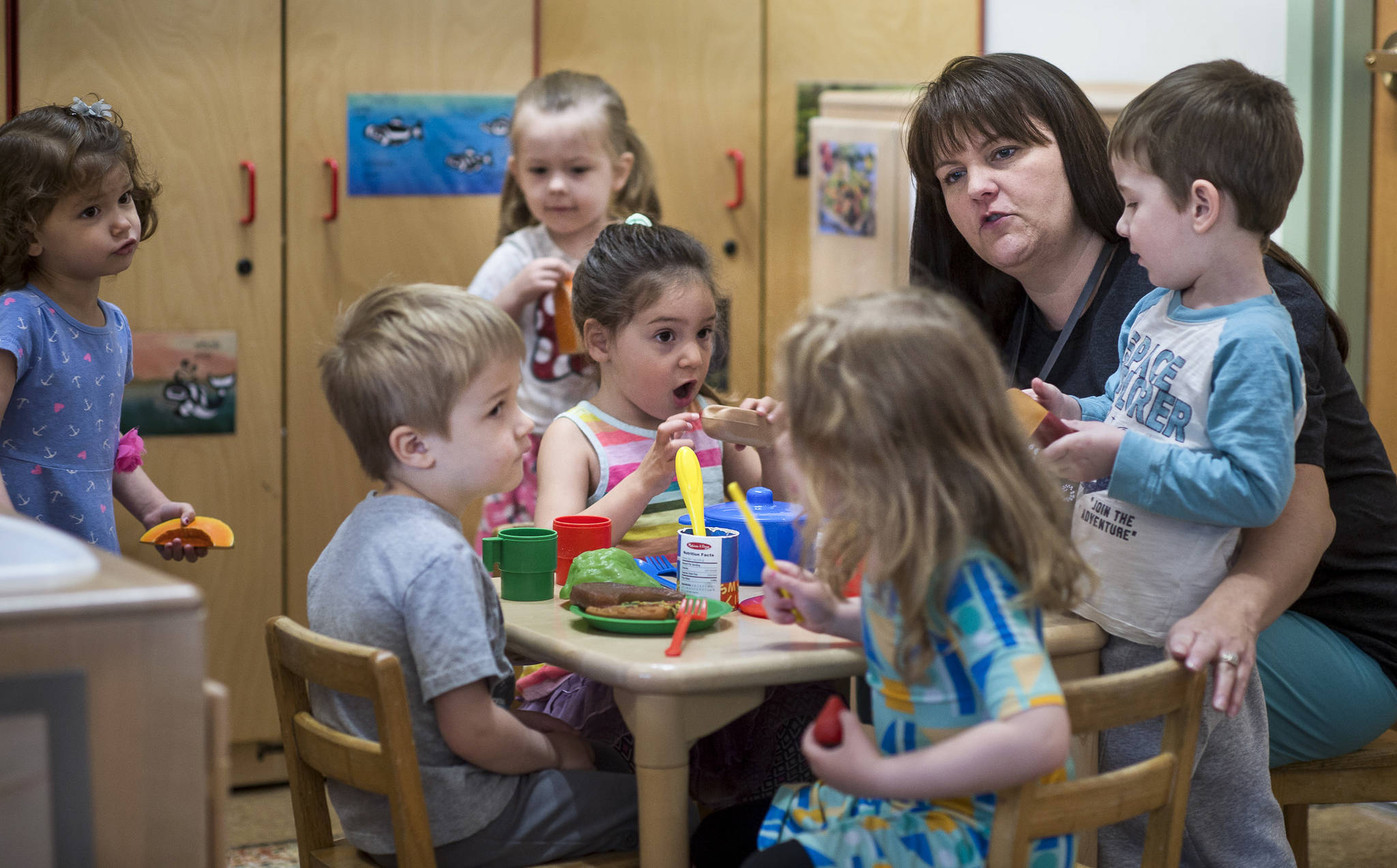Local child care providers are concerned preschools around Alaska could see drastic changes if Alaska Department of Health &Social Services Child Care Program Office proposed child care center licensing goes through.
The proposed changes, which were made public March 5, could affect the number of students per child care center, qualifications for teachers and costs for parents. According to the 51-page document that outlines the proposed changes, an administrator of a child care facility with current certification would need to have a bachelor’s degree in a child care related field and in-service training, and an administrator without a current certification would need a master’s degree in a related field and in-service training.
“One of the concerns is changing the administrative qualifications,” said Gretchen Boone, director at Gold Creek Child Development Center, a Juneau preschool program that focuses on early childhood development. “This would prevent several programs from meeting these criteria.”
Teachers and administrators without higher education currently have the option of earning a Child Development Associate (CDA) credential through the Council for Professional Recognition. This credential, however, would no longer apply in the new proposed regulations.
“There are programs that could potentially have owners and administrators who may not be qualified to run their own programs,” Boone said. “They may have to close.”
Lupita Alvarez, the preschool teacher at Montessori Borealis, said she would be impacted. While she has a Montessori certificate for teaching, she would have to get the additional education. Alvarez also said if she were to get the additional education, she would expect to be compensated with higher pay.
“Who will pay for that?” Alvarez questioned.
With these concerns in mind, seven child care offices in Juneau — Discovery Preschool, Montessori Borealis, Gold Creek, Juneau Montessori School, Gehring Nurserym, ABC Center and TLC Learning Center — worked together on a joint letter to the state’s Child Care Program Office specifying their key issues. One of the groups’ main concerns is maximum group student sizes.
Currently, the ratio for services from birth to 12 months is 10 children to two adults.
However, if the proposed changes occur, it will lower that number to eight to two, thus taking away those tuition costs from the programs.
According to the proposed changes, groups of all ages would see decreases in sizes.
Boone said she and Assistant Director Colleen Brody meet the education requirements at Gold Creek, but they are concerned how their facility would be impacted by the reduced enrollment. If enrollment is cut, it could impact staffing, Boone said. Gold Creek’s full-time monthly tuition rates are all at least $1,000.
Another concern is that some of the other child care facilities could shut down if they cannot last through the proposed changes.
Boone said with Gold Creek at maximum capacity already, there is a chance of even fewer services in town that could provide proper child care.
“There is not enough supply to meet the demand,” Boone said. “Regulations could mean we have even less supply. We have no timeline when we will be able to take a child off the waitlist.”
Juneau has had issues with affordable child care over the years. The proposed changes may lead to even more problems.
This leads to one of the fears Michael Vaughn, a parent who has one child currently attending Gold Creek and one who has already attended Gold Creek, has if costs do increase due to these changes.
“There might be less child care that is regulated that may pop up in peoples’ garages with unknown degrees of safety and support,” Vaughn said.
Katie Joca, Executive Director at Juneau Montessori School, said the changes also came as a surprise. While the Child Care Program Office did tell the child care areas changes could be made during a visit last summer, they did not specify what they would be.
“Last year, late July or early August, the Child Care Program did visit communities around the state to give a heads-up that there could be some changes, but what was presented then was not what was proposed, ” Joca said.
Joca explained that the classroom size changes, change in administration requirements and the food educators ate around the children were among the differences from what was presented last year and what is in the proposed changes. According to the proposed changes, “caregivers shall eat only foods that meet the child care food program requirements.” Some of the requirements include eating cereals with less than six grams of sugar per ounce and the amount of meat or yogurt eaten in a serving.
“Those came out of nowhere,” she said.
There is no timeline on when these changes could take place.
The Empire has repeatedly contacted the Child Care Program Office for a comment on this story this week but did not receive any comments on the proposed changes to the regulations.
• Contact reporter Gregory Philson at gphilson@juneauempire.com or call at 523-2265. Follow him on Twitter at @GTPhilson.

